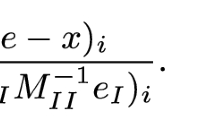Abstract
A simple and unified analysis is provided on the rate of local convergence for a class of high-order-infeasible-path-following algorithms for the P*-linear complementarity problem (P*-LCP). It is shown that the rate of local convergence of a ν-order algorithm with a centering step is ν + 1 if there is a strictly complementary solution and (ν + 1)/2 otherwise. For the ν-order algorithm without the centering step the corresponding rates are ν and ν/2, respectively. The algorithm without a centering step does not follow the fixed traditional central path. Instead, at each iteration, it follows a new analytic path connecting the current iterate with an optimal solution to generate the next iterate. An advantage of this algorithm is that it does not restrict iterates in a sequence of contracting neighborhoods of the central path.
Similar content being viewed by others
References
J.F. Bonnans and C.C. Gonzaga, “Convergence of interior point algorithms for the linear complementarity problem,” Mathematics of Operations Research, vol. 21, pp. 1-25, 1996.
R.W. Cottle, J.-S. Pang, and R.E. Stone, The Linear Complementarity Problem, Academic Press: Boston, 1992.
M.S. Gowda, “On the extended linear complementarity problem,” Mathematical Programming, vol. 72, pp. 33-50, 1996.
P. Hung and Y. Ye, “An asymptotical O(\(\sqrt {nL} \))-iteration path-following linear programming algorithm that uses long steps,” SIAM Journal on Optimization, vol. 6, pp. 570-586, 1996.
M. Kojima, N. Megiddo, T. Noma, and A. Yoshise, A Unified Approach to Interior Point Algorithms for Linear Complementarity Problems, Springer-Verlag: Berlin, 1996.
K. McShane, “Superlinearly convergent O(\(\sqrt {nL} \))-iteration interior point algorithms for LP and the monotone LCP,” SIAM Journal on Optimization, vol. 4, pp. 247-261, 1994.
S. Mizuno, “A superlinearly convergent infeasible-interior-point algorithm for geometrical LCPs without a strictly complementarity condition,” Mathematics of Operations Research, vol. 2, pp. 382-400, 1996.
S. Mizuno, F. Jarre, and J. Stoer, “A unified approach to infeasible-interior-point algorithm via geometrical linear complementarity problems,” J. Appl. Math. Opt., vol. 13, pp. 315-341, 1996.
R. Monteiro, I. Adler, and M. Resende, “A polynomial-time primal-dual affine scaling algorithm for linear and convex quadratic programming and its power series extension,” Mathematics of Operations Research, vol. 15, pp. 191-214, 1990.
R. Monteiro and T. Tsuchiya, “Limiting behavior of the derivatives of certain trajectories associated with a monotone horizontal linear complementarity problem,” Mathematics of Operations Research, vol. 21, pp. 793-814, 1996.
F.A. Potra and R. Sheng, “A superlinearly convergent infeasible-interior-point algorithm for degenerate LCP,” Technical Report, Dept. of Math., The University of Iowa, USA, 1995.
J. Stoer and M. Wechs, “Infeasible-interior-point paths for sufficient linear complementarity problems and their analyticity,” Mathematical Programming, vol. 83, pp. 407-423, 1998.
J. Stoer, M. Wechs, and S. Mizuno, “High order infeasible-interior-point methods for solving sufficient linear complementarity problems,” Mathematics of Operations Research, vol. 23, pp. 832-862, 1998.
J.F. Sturm, “Superlinear convergence of an algorithm for monotone linear complementarity problems, when no strictly complementary solution exists,” Mathematics of Operations Research, vol. 24, pp. 72-94, 1999.
H. Väliaho, “P*-matrices are just sufficient,” Linear Algebra and Its Applications, vol. 239, pp. 103-108, 1996.
S.J. Wright and Y. Zhang, “A superquadratic infeasible-interior-point method for linear complementarity problems,” Mathematical Programming, vol. 73, pp. 269-289, 1996.
Y. Ye and K. Anstreicher, “On quadratic and O(\(\sqrt {nL} \)) convergence of a predictor-corrector algorithm for LCP,” Mathematical Programming, vol. 62, pp. 537-551, 1993.
G. Zhao, “Interior point algorithms for linear complementarity problems based on large neighborhoods of the central path,” SIAM Journal on Optimization, vol. 8, pp. 397-413, 1998.
Author information
Authors and Affiliations
Rights and permissions
About this article
Cite this article
Zhao, G., Sun, J. On the Rate of Local Convergence of High-Order-Infeasible-Path-Following Algorithms for P*-Linear Complementarity Problems. Computational Optimization and Applications 14, 293–307 (1999). https://doi.org/10.1023/A:1026492106091
Issue Date:
DOI: https://doi.org/10.1023/A:1026492106091




